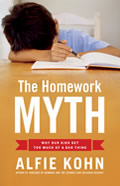I wrote this post for the Cooperative Catalyst.
While teaching my grade 8 students, I wanted to discuss the idea of distractions, so I read them an excerpt from Rework by Jason Fried & David Heinemeier Hansson that discusses how interruption is the enemy of productivity:
My class proceeded to have a very interesting conversation about all of the distractions they have in the day. Many of them could relate to the ‘communication addiction’ that the excerpt referred to. We all admitted that sometimes we are the annoyed (the person who would like to tell others to ‘screw off’) and the annoying (the person who should be told to ‘screw off’).
It didn’t take long for some of my students to identifying other kinds of distractions that they were not responsible for. Ethan, a grade 8 student of mine, blogged his thoughts for me. Here’s Ethan’s take on how undemocratic school bells are:
Ethan’s point is well taken. He’s begging for the opportunity to be given more rights and responsibilities than the archaic school bell schedule can ever give him. He’s searching for a more democratic version of schooling. It’s time we took students like Ethan seriously.
While teaching my grade 8 students, I wanted to discuss the idea of distractions, so I read them an excerpt from Rework by Jason Fried & David Heinemeier Hansson that discusses how interruption is the enemy of productivity:
Interruptions break your workday into a series of work moments. Forty-Five minutes and then you have a call. Fifteen minutes and then you have lunch. An hour later, you have an afternoon meeting. Before you know it, it’s five o’clock, and you’ve only had a couple uninterrupted hours to get your work done. You can’t get meaningful things done when your constantly going start, stop, start, stop…
And go all the way with it. A successful alone-time period means letting go of communication addiction. During alone time, give up instant messages, phone calls, e-mail, and meetings… Your day is under seige by interruptions. It’s on you to fight back.
My class proceeded to have a very interesting conversation about all of the distractions they have in the day. Many of them could relate to the ‘communication addiction’ that the excerpt referred to. We all admitted that sometimes we are the annoyed (the person who would like to tell others to ‘screw off’) and the annoying (the person who should be told to ‘screw off’).
It didn’t take long for some of my students to identifying other kinds of distractions that they were not responsible for. Ethan, a grade 8 student of mine, blogged his thoughts for me. Here’s Ethan’s take on how undemocratic school bells are:
School bells, the most ridiculous invention on earth. Some people want to spend a certain amount of time on certain subjects, for example; if I prefer math more than social, shouldn’t I have the right to stay as long as I like at math, and as long as I learn something and don’t screw off? No, instead, a inanimate, ringing tin can have the right to tell me what to do, where to go, and make decisions for me. A piece of metal has more authority than a living human being! Truthfully, this thought makes me feel small, and without any say. I think students should have the right to learn what they want, when they want, wherever they want and however they want to do it! If I could take health and science classes all day I would. Why? Because I am facinated about how things work, especially the human body. As for social, i don’t especially want to know what happened all those years ago. I’m also not saying that social is pointless either, many people find the past very interesting, just not me. School’s purpose in my eyes is to prepare you for the future, so why not be able to tune your studies to what you would like to become?
Ethan’s point is well taken. He’s begging for the opportunity to be given more rights and responsibilities than the archaic school bell schedule can ever give him. He’s searching for a more democratic version of schooling. It’s time we took students like Ethan seriously.



